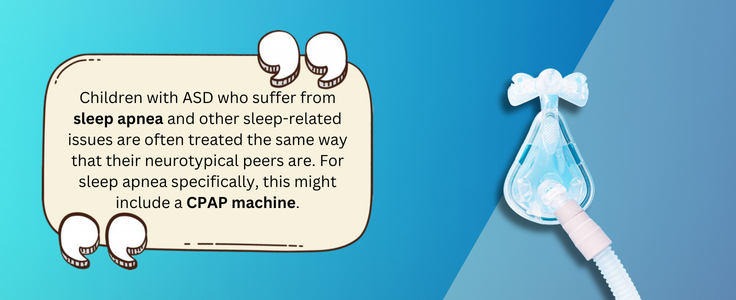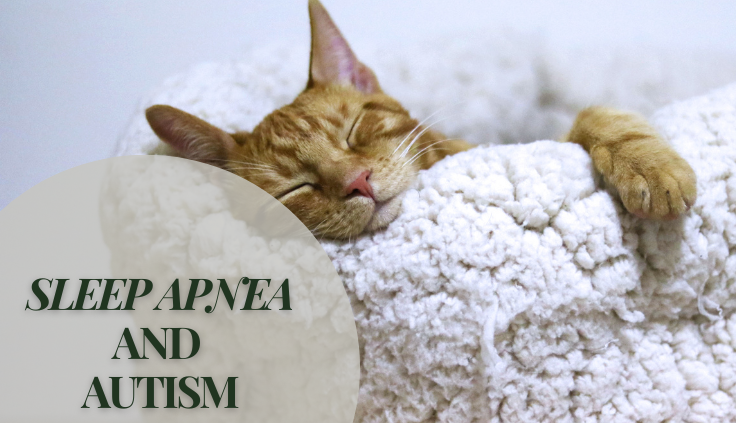Apnea del sueño y autismo
Muchas personas dan por sentado que duermen bien. Pueden dormirse con relativa facilidad, permanecer dormidos durante la mayor parte de la noche y sentirse descansados cuando se despiertan por la mañana.
Sin embargo, hay muchas personas que no consiguen dormir bien de forma constante. Esto puede deberse a insomnio, apnea del sueño u otros problemas del sueño.
Personas que han trastorno del espectro autista (TEA) suelen tener problemas de sueño. De hecho, varios estudios sugieren que más de la mitad de los niños autistas padecen al menos un problema crónico de sueño.
Más información sobre la relación entre el autismo y los problemas de sueño
Uno de los problemas de sueño más graves a los que se enfrentan los niños con autismo es la apnea del sueño. Los niños que la padecen pueden dejar de respirar a veces durante la noche y roncar ruidosamente y, a veces, su corazón puede incluso detenerse varias veces durante un momento mientras duermen.
A continuación, hablaremos de la conexión entre la apnea del sueño y el autismo.
Índice
¿Qué es la apnea del sueño?
La apnea del sueño es un trastorno del sueño que puede ser muy grave. Generalmente se caracteriza por una respiración que se detiene y vuelve a empezar repetidamente a lo largo de la noche.
Algunos de los signos más comunes de que una persona puede tener apnea del sueño son los ronquidos fuertes al dormir y la sensación de cansancio cada mañana, aunque haya dormido toda la noche.
Existen tres tipos distintos de apnea del sueño, cada uno de los cuales tiene una causa diferente.
La apnea obstructiva del sueño, o AOS, es el tipo más frecuente. Se produce cuando los músculos de la tiroides se relajan, lo que bloquea el paso normal del aire a los pulmones.
El segundo tipo se denomina apnea central del sueño. Se produce cuando el cerebro no envía las señales adecuadas a los músculos encargados de controlar la respiración.
La apnea del sueño compleja, denominada apnea central del sueño emergente del tratamiento, se produce cuando una persona padece AOS que acaba convirtiéndose en ASI después de recibir tratamiento para la AOS.
La apnea del sueño se diagnostica mediante un estudio del sueño, en el que un profesional monitoriza al paciente mientras duerme en un entorno controlado. La persona está conectada a varios sensores que ayudan a determinar la frecuencia cardiaca y la respiración del paciente a lo largo de la noche.
¿Por qué es un problema la apnea del sueño?
La apnea del sueño se considera un problema médico muy grave. Las personas que la padecen pueden sufrir complicaciones importantes.
Esto incluye fatiga durante el día, problemas cardíacos y/o hipertensión, diabetes de tipo 2, problemas hepáticos, síndrome metabólico y otros problemas cardiovasculares.
Las personas que padecen apnea del sueño suelen recibir tratamiento a través de un Máquina CPAPque se conoce como máquina de presión positiva continua en las vías respiratorias. Se trata de un dispositivo similar a un casco con una mascarilla que se ajusta a la nariz de la persona, a la boca o a ambas, y que introduce aire en el cuerpo de forma continua para que las vías respiratorias permanezcan abiertas.
¿Cuál es la relación entre la apnea del sueño y el autismo?
Muchos estudios han revelado que los niños autistas tienen más riesgo de padecer apnea obstructiva del sueño que sus compañeros neurotípicos.
UNA Estudio de 2022Por ejemplo, en un estudio realizado en el Reino Unido, se observó que era "mucho más frecuente" que los niños con TEA presentaran síntomas de AOS. Según el estudio, algunos de los síntomas más comunes de AOS en niños con espectro autista eran somnolencia excesiva durante el día, cambios en su función cognitiva y ronquidos fuertes.
Por desgracia, algunos síntomas de la AOS también se solapan y, por lo tanto, exacerban los síntomas del TEA del niño. Esto puede retrasar el diagnóstico de AOS en niños que padecen ambas afecciones.
Además de la apnea del sueño, los niños con autismo pueden tener otros problemas de sueño. Por ejemplo hiper o hiposensibilidad a diversos estímulos sensorialeshiperactividad o hiperactivación, una alteración del ciclo típico del ritmo circadiano y mucho más.
Los niños con TEA que padecen apnea del sueño y otros problemas relacionados con el sueño suelen recibir el mismo tratamiento que sus compañeros neurotípicos. En el caso concreto de la apnea del sueño, esto puede incluir una máquina CPAP.

También es importante que los padres ayuden a los niños con autismo a establecer una buena rutina nocturna, crear un buen entorno de sueño libre de distracciones y practicar otras medidas de "higiene del sueño".
Blue Gems ABA puede ayudar a los niños autistas con problemas de sueño
Niños en la el espectro autista suele tener problemas de sueñoincluyendo la apnea del sueño. Muchos métodos de tratamiento tradicionales también se aplican a los niños con TEA, aunque el análisis conductual aplicado especializado (terapia ABA) también puede ayudar enormemente.
En Blue Gems ABAContamos con un equipo de BCBA que administra terapia ABA individualizada a niños autistas. Este enfoque basado en la ciencia y la evidencia para el aprendizaje ayuda a los niños a desarrollar sus habilidades sociales y comunicativasAl mismo tiempo, aprenden a modificar sus comportamientos en respuesta a muchas de las cosas que pueden estar causando sus problemas de sueño.
Para más información Contacto hoy.




